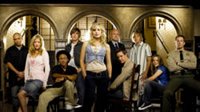 None of those I’ve spoken to about the prospect of seeing Oliver Stone’s World Trade Center have expressed much enthusiasm, the consensus being that our feelings about September 11 were articulated very well while watching the endless news coverage of the tragedy that day. What can a film offer us to improve our comprehension of it? Plus, the potential of this film to be a Hollywood confection that pillaged the all-too-real emotions of those involved was off-putting – why take the chance, especially when the trailer only reinforced that idea.
None of those I’ve spoken to about the prospect of seeing Oliver Stone’s World Trade Center have expressed much enthusiasm, the consensus being that our feelings about September 11 were articulated very well while watching the endless news coverage of the tragedy that day. What can a film offer us to improve our comprehension of it? Plus, the potential of this film to be a Hollywood confection that pillaged the all-too-real emotions of those involved was off-putting – why take the chance, especially when the trailer only reinforced that idea.Thankfully, Stone’s film is not overtly sentimental. He has chosen to tell the story of two of the very few survivors of the World Trade Centre collapse, Port Authority police officers John McLoughlin (played by Nicholas Cage) and Will Jimeno (played by Michael Peña), who were about to contribute to the rescue of those in the towers before the buildings collapsed on top of them. Much of the film takes place as the two men are pinned beneath rubble and begin to lose hope, which is intercut with their wives Donna McLoughlin (Maria Bello, looking startlingly different merely with blue contact lenses) and Allison Jimeno (Maggie Gyllenhaal) enduring the wait for any news.
By focusing solely on these individuals, Stone has completely sidestepped the political implications and ramifications of September 11, all the more shocking given his filmography. Stone has stated that his intention was to return us to the human tragedy that precipitated the political quagmire of the last five years, and upon reading that I realised he was right. Our awareness of the myriad stories of loss and community spirit in the following days and weeks has been replaced by a focus on the broad-ranging consequences, from domestic law to foreign insurgency. But September 11 was a brutal tragedy on a shattering scale even divorced from the intercultural and political components, and this cannot be overlooked. It’s therefore fitting that both of the ‘September 11 movies’ this year (the other being Paul Greengrass’s United 93) have addressed the regular men and women affected before the medium broaches the political side. Fittingly, Oliver Stone has announced that he will soon direct a film critiquing the US response to 9/11 in Afghanistan…
The tone of World Trade Center is key to Stone’s evasion of sentimental excess. Even in his few concessions to such as movie clichés as everyday memories visualised on screen in soft light while the character waits or mourns, the immediate reality of September 11 lingers throughout and even manages to win out over the presence of recognisable stars Bello, Gyllenhaal, and most notably Cage, all of whom manage to blend into Stone’s quiet and fragile vision of this story. Silence reigns through this film despite the carnage that instigates things, as if to incorporate too much sound would shatter the illusion of there being no illusion, which contributes to its eerie clarity. While watching, one experiences a constant, ever-so-slight dread, since we are engaging with a true event that seemed the stuff of movies and that is still fresh in our memories, and we’re doing so in the seat we reserve for entertainment and thought-provoking fiction. Watching the film becomes a process of continuous disbelief rather than suspension thereof, but this strange interplay works in the film’s favour. Without this unnerving clarity, Stone’s work would become a Hollywood artifact rather than a human response to a real-life human cataclysm, and it’s what allows one of Cage’s final lines to Bello to evoke wide-eyed, sincere truth outside its cinematic confines rather than just moviemotion (hey, I just coined a word), and it’s powerful and humbling to witness.
But did this movie even need to be made? Does it give us further insight in how we should respond to September 11? I don’t think so, but only insofar as no movie on this subject simply must be made. If World Trade Center had succumbed to Hollywood sentimentality and its usual distancing from reality, then it definitely should never have been greenlit. But as it stands, it is a sensitive, well-judged consideration of a subject we don’t need to be enlightened about. However, if it reminds us of the people who died without us simultaneously contemplating the US government’s ensuing war, then it has done a good thing, as those people and their loved ones need to be thought of in purely human terms, not in those of the government that has waged war so recklessly on their behalf.





 Some new characters are also introduced, including Parker (Julie Gonzalo), who initially seems a baffling choice for a series regular since she’s a carbon copy of the valley girls that the show has lampooned before, but an unexpected role in the larger mystery looks to ensure that her character is much more than one-note. There’s also Wallace’s roommate, Piz (Chris Lowell), who is being touted as a rival to Logan for Veronica’s affections. He’s a pleasantly dorky guy, and thus a much more interesting and credible alternative for Veronica than the cardboard Duncan Kane: his down-to-earth nature should prove a tempting counterpoint for her to Logan’s brooding complexities.
Some new characters are also introduced, including Parker (Julie Gonzalo), who initially seems a baffling choice for a series regular since she’s a carbon copy of the valley girls that the show has lampooned before, but an unexpected role in the larger mystery looks to ensure that her character is much more than one-note. There’s also Wallace’s roommate, Piz (Chris Lowell), who is being touted as a rival to Logan for Veronica’s affections. He’s a pleasantly dorky guy, and thus a much more interesting and credible alternative for Veronica than the cardboard Duncan Kane: his down-to-earth nature should prove a tempting counterpoint for her to Logan’s brooding complexities. 